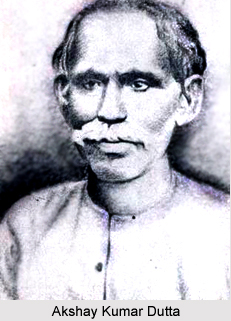 Akshay Kumar Dutta (15 July 1820 - 18 May 1886) was not a practical reformer, one of the architects of Bengal Renaissance. Through his writings he employed a great influence. He exercised great influence through his writings. He was one of the main forces of progress and enlightenment in his time.
Akshay Kumar Dutta (15 July 1820 - 18 May 1886) was not a practical reformer, one of the architects of Bengal Renaissance. Through his writings he employed a great influence. He exercised great influence through his writings. He was one of the main forces of progress and enlightenment in his time.
Early Life of Akshay Kumar Dutta
He was born in Chupi in Burdwan district and arrived to Kolkata at the age of ten years three months in the 1830 autumn with his elder cousin after the Puja vacations. The establishment in Kolkata was normally run by his father Pitambar Dutta a cashier by the ferry ghat, not known to be distinguished for anything other than domestic virtues. The family was distinguished and indigent though not dismally so. Pitambar his father was too old to take proper care of him. He got himself admitted in a missionary school in the meantime where English was taught free of charge. He was confined to privacy for long time. He was single-heartedly devoted to duty and noble pursuit of knowledge whether it was English or Persian. While learning English meant the attaining the stature of a learnt babu conversant with the colonial tongue, Persian thrived to be the language of the law courts. He was indebted to Iswar Gupta for his literary career as he had discovered his talent and encouraged him to write for Prabhakar.
Literary Career of Akshay Kumar Dutta
As far as cultural landscape of Bengal was concerned Tattwabodhini Sabha the main aim of which was to discuss theological and philosophical matters under the able leadership of Debendranath Tagore to propagate the Bramho theme of monotheism based on the teachings of Upanishads. He was in later in charge of the monthly magazine Tattwabodhini Patrika as the editor of the same. Debendranath had earlier noticed Akshay`s intellectual prowess in Prabhakar, which made the former provide the latter the role of an editor. His scientific and philosophical articles brought about an increase in the store of the country`s thought and knowledge. The Tattwabodhini raised the level of Bengali journalism. Post retirement from the editorship he served as a post as school-master.
Charupath was his most popular work. His philosophical and scientific writings included Bahyabastur sahit Manabprakritir Sambandha Bichar, Dharmaniti, Prachin Hinduder Samudrajatra O Banijya bistar, Padarthabidya. He was inspired by English compositions. The Bharatbarshiya Upasak Sampraddy, was based on Horace Hayman Wilson`s Religious Sects of the Hindus.
However, his thought cannot be considered as always profound and subtle. His language was also not free from the dull periphrasis rhetoric of his predecessors. Akshay Kumar was a teacher and a reformer. Bengali prose acquired the needed qualities of clarity and vigour, reserved the derivative, utilitarian, and didactic character. He had composed the poetry-book Anangamohan at the age of 14. He considered Ram Mohan Roy as his guru scientific and educational matters. He wrote on astronomy, mathematics and geology.
He was the first person in the Brahmo Samaj to proclaim that the Vedas were not ideal. He managed to convince Debendranath Tagore in this respect. He was highly influenced by Francis Bacon, Isaac Newton, John Stuart Mill, Auguste Comte, Charles Darwin, Thomas Henry Huxley and Ram Mohan Roy. He was among the first few men who had presented an empiricist critique of the ancient Indian philosophies. He advocated that much of Indian philosophy was suffused with atheist and cynical thought. He wanted to free people from the clutches of superstition and blind beliefs. He was the first Indian to write on virtual linguistics.













